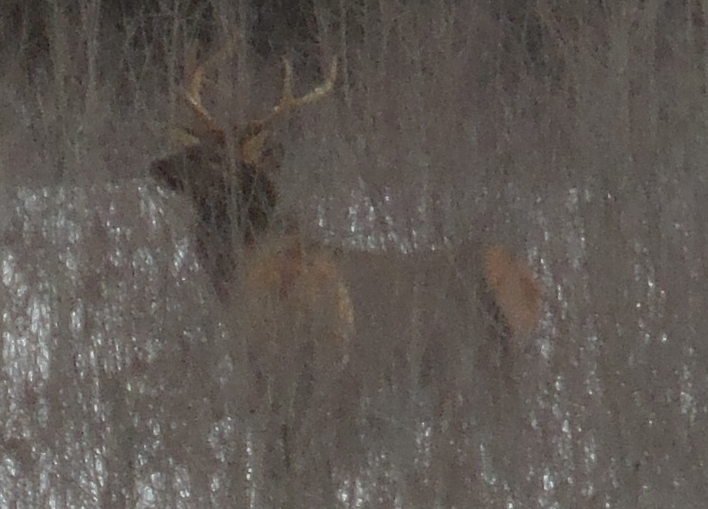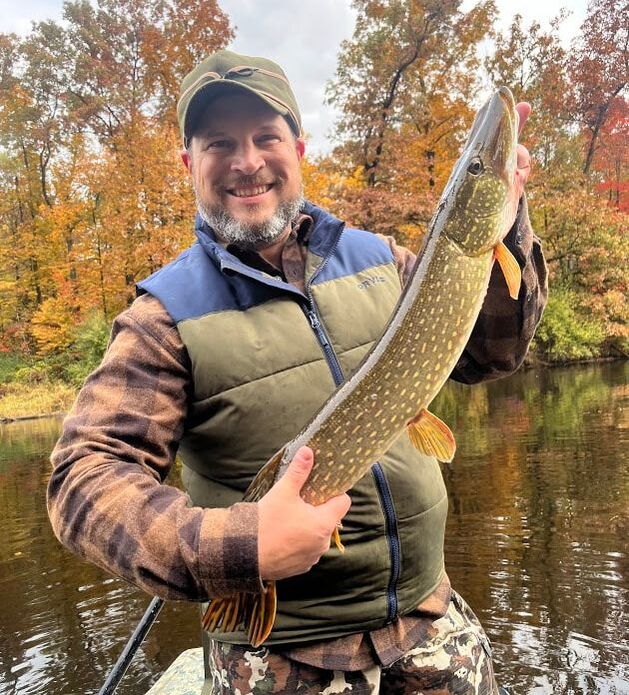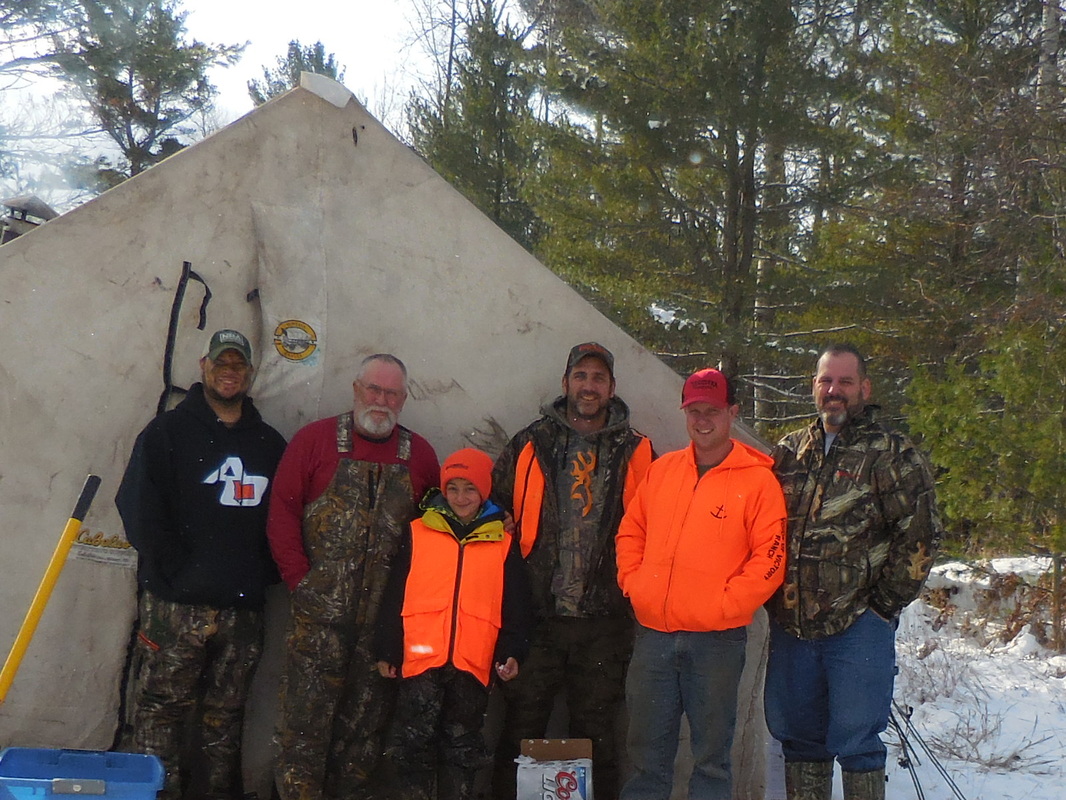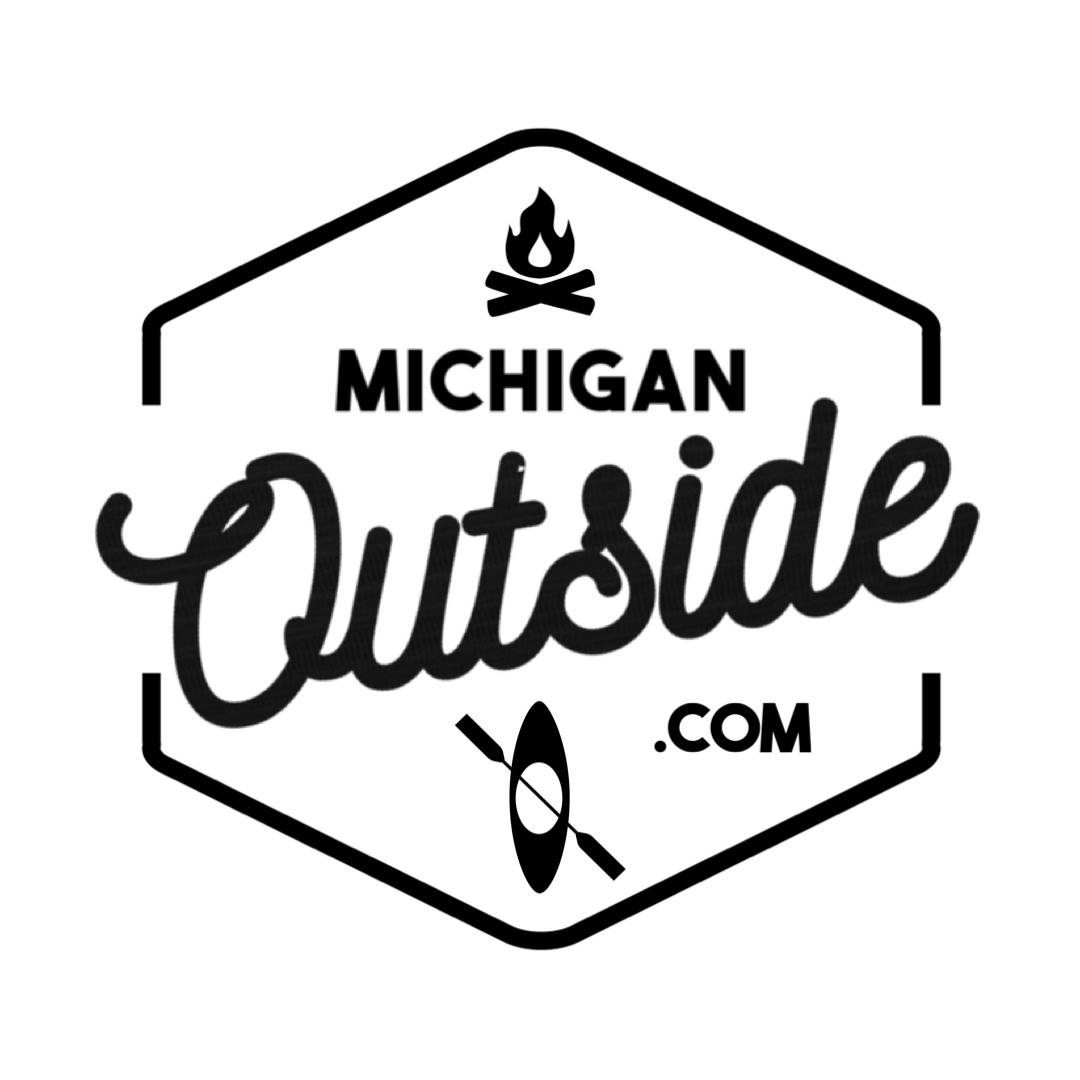 A young bull elk near our camp in the Pigeon River Country. A young bull elk near our camp in the Pigeon River Country. “I am so thankful to whoever the guy was who had the idea for this place,” said my dad. “We’d have to be millionaires to buy property like this for four guys to hunt.” That guy was Parrish Storrs (P.S.) Lovejoy, the first Game Division Chief for the Michigan Department of Conservation (now DNR) and a contemporary of Aldo Leopold, and the place is the Pigeon River Country, also known as the “Big Wild.” Most of its 105,000-plus acres of public land was purchased through hunting license dollars and tax reversion in the early twentieth century under Lovejoy’s leadership and vision, with more added later on by the Michigan Natural Resources Trust Fund. We set up our new deer camp here on public land for the first two weekends of firearm deer season, and it did not disappoint. My dad, Denny, and I had the idea to start a new deer camp with my brother Kellen since my brother wasn’t able to make it to our old deer camp on Beaver Island on a regular basis. But without hundreds of thousands of dollars to purchase hunting property, we knew we’d locate it on public land. And, with my dad and brother living in Gaylord, there’s no better public land than the Pigeon River Country (PRC), which also happens to be my favorite place to hunt, fly-fish, backpack, volunteer on fish and wildlife habitat projects, and generally roam. My dad and brother have spent plenty of time horseback in the PRC, too. We scouted a few different areas of the PRC for deer sign and potential camp locations in the months before firearm season, and found plenty. Ultimately, after talking to elk guide Preston Casselman, we decided on an area with less hunting pressure and good habitat (don’t even ask me where), rather than abundant deer sign, excellent habitat and lots of other hunters. We bought a used old-school Montana Canvas wall tent, including poles and wood stove and some used cots, as well as some new sleeping bags and pop-up blinds from Jay’s Sporting Goods in Gaylord. Then my cousin Scott let us know that he was in, too, so we had four guys for deer camp, just enough for euchre! So, for less than $1,000, we had a deer camp and a place to hunt. We had a great time roaming ridges, sitting at the edge of swamps, learning the area, playing euchre and telling stories. We saw a few deer including several does, a couple spikes my brother passed on, a six-point my dad passed on, an eight-point my cousin spooked while turning in his blind, along with a few elk and a coyote. I tracked a couple bucks this weekend but never saw them. We didn’t get any deer, but they were there. The opportunity’s there, and a couple hunters hunting just south of us scored ten and eight-point bucks, respectively. We just have to learn how to hunt this area better. Packing up camp on Sunday, after talking about how much fun we had, my dad turned to me and said, “We’re pretty lucky. Who else can do this?” Actually, I told him, everyone can. That’s the beauty of public land. Anyone could do what we did. We just went and did it. And many other hunters do every year. That’s the “democracy” of hunting, under the North American Model of Conservation. It’s not that we vote on every hunting and fishing regulation – we base that on sound science – but everyone has the opportunity to hunt; it’s not just a privilege for the privileged, as it was in much of Europe before ‘Murica. And public land is critical to that, because without a place to hunt, what good is the right? Public land isn’t a perfect place to hunt, but with a little cooperation with your fellow public land hunters, it can be a good place to hunt. We stopped and talked with several other hunters in the area. Asked them what general area they were hunting, let them know where we would be, and left each other with “good luck” and mutual understandings that we wouldn’t interfere with each other’s hunts. And we didn’t. Public land can get better, too. And it is. The DNR is investing a significant portion of the increase in hunting license sales in improving public land wildlife habitat, including through its Wildlife Habitat Grant program. MUCC applied for and was awarded a $156,000 Wildilfe Habitat Grant to improve public land wildlife habitat through our On the Ground (OTG) program, and we’re implementing that through at least 25 – and probably more – projects on publicly accessible hunting land around the state, including one or two in the Pigeon River Country. That’s part of why I’m proud that we’ll have Sarah Topp joining us as our new Huron Pines AmeriCorps member to help organize and manage volunteer projects. To see a little of why we knew she was the right person for the job, check out this featurefrom Gaylord Herald-Times outdoor columnist Chris Engle on her work with the Pigeon River Country Association in 2012. You can sign up here for our first project of the year in just a couple weeks at Allegan State Game Area to improve grouse and woodcock habitat by cutting old aspen to make room for new aspens. Also, mark your calendars for January 17: we’re hosting a chainsaw safety training session by Chuck Oslund so that those interested in volunteering in the future can make sure they’re as safe as can be while operating a saw on public land. You can sign up here for the training. But public land isn’t universally appreciated. For every acre of public land, there is someone or some entity that wants to privatize it. There are bordering land owners who try to post a few extra acres of neighboring public land. Industries have development ideas for a mine or a potato farm or something else. And those plans aren’t always bad, as long as there’s a transparent and public process and we don’t lose hunting land or critical wildlife habitat. We even have legislation making sure that there is no net loss of public hunting land under the DNR’s control. But it’s up to us – citizens, hunters, conservationists and watchdog groups like MUCC – to make sure that happens. Public land gets sold sometimes, and sometimes it should. Prioritized parcels get purchased by the state, and sometimes they should. Natural resources from public lands get sold, either through mineral lease or timber sale, and often that has no negative effect or even a positive effect on the land for wildlife. The proceeds from those sales fund more public land and park improvements through the Michigan Natural Resources Trust Fund, and fire protection through timber sales. Timber cuts allow forest regeneration, young browse for wildlife, edge habitat and cover when the tops are left. But if the processes aren’t transparent, then there is a lack of trust in the system, and that jeopardizes legitimate public land transactions. That’s why we have strategic land management plans to guide these transactions and spell out the public process. And our state, both government, agencies, and citizens, need to make sure we define, implement and follow those plans to ensure transparency. At its heart, public land is about democracy. It’s the promise that if you want to hunt, and you purchase your license, you’ll have a place to do so. And if four guys scrap together enough money for a used tent and new sleeping bags, they’ll have a deer camp and the opportunity to hunt deer, even if they don’t end up shooting one. That’s what I’m thankful for. Thank you P.S. Lovejoy. |
AUTHOR
Drew YoungeDyke is an award-winning freelance outdoor writer and a Director of Conservation Partnerships for the National Wildlife Federation, a board member of the Outdoor Writers Association of America, and a member of the Association of Great Lakes Outdoor Writers and the Michigan Outdoor Writers Association.
All posts at Michigan Outside are independent and do not necessarily reflect the views of NWF, Surfrider, OWAA, AGLOW, MOWA, the or any other entity. ARCHIVES
June 2022
SUBJECTS
All
|



 RSS Feed
RSS Feed